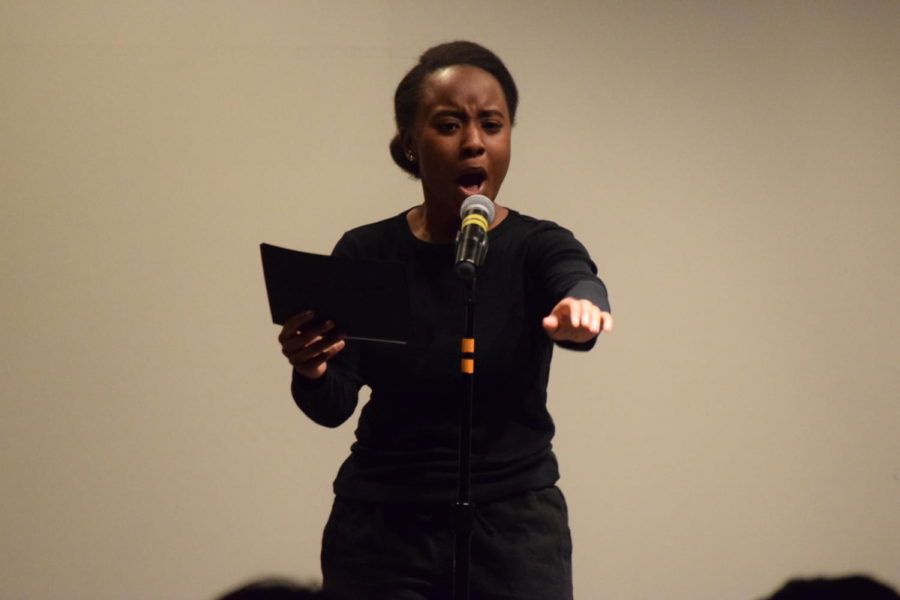The Vagina Monologues shine light upon women’s issues
Tiara Turner shows emotion during the “Because He Liked to Look At It,” during Thursday night’s The Vagina Monologues performance. The Vagina Monologues is a benefit production of Eve Ensler’s, presented by V-Day Iowa State University 2017.
February 19, 2017
The stage lights shone down. Each performer wore variations of black. Black dresses, black shirts and pants, black shoes or boots. They each looked out to the audience with a clear purpose.
They were present to deliver The Vagina Monologues.
The Vagina Monologues, written by Eve Ensler in 1996, were brought about after Ensler conducted hundreds of interviews with women on the views of their sex, relationships and violence. They were then transformed into the pieces known today.
The Vagina Monologues were brought to Iowa State in 2001 by a student known as Alissa Stoehr, now part of the directing team of The Vagina Monologues.
The Vagina Monologues were hosted by the Margaret Sloss Women’s Center, the Society for the Advancement of Gender Equity (SAGE) and the Student Union Board.
Stoehr, a senior in political science at the time, was at the national conference for the Feminist Majority Foundation in Baltimore when she heard Ensler read part of the monologues.
“It was very interesting to hear her celebrate women’s voices and to give voice to other women who didn’t know that [they had one],” Stoehr said.
Stoehr’s interest wouldn’t end there.
“That’s where I first heard [the monologues],” Stoehr said. “And [I thought], ‘We need to bring this to campus.’”
That year, Stoehr produced the performance with Pat Miller, director of the lectures program.
“I thought it’d be fun to bring it to campus and have anyone that identified as a woman [be] able to perform in it,” Stoehr said.
Stoehr’s interaction with The Vagina Monologues would continue for several years.
In 2007, while working toward her master’s degree, Stoehr performed in the monologues herself. A decade later, now in 2017, she is part of the directing team.
The Vagina Monologues, for the Iowa State community, are on their 16th year.
The Vagina Monologues address numerous issues seen by women. Among some of them are sexual pleasure, sexual assault and reclamation of slang referring to female genitals.
The performance is seen by many as empowering, but not without consequence of being problematic to others as it does include stereotyping groups by moans, a positive representation of prostitution and the issue of inclusivity to women who don’t have vaginas and those who have vaginas but do not identify as women.
Regardless, a crowd still comes out to see the performance each year.
“It’s nice to see that people still care after all these years,” Stoehr said. “Especially now, with extreme budget cuts … [the fact that] people are still willing to come out and maybe step out of their comfort zone for a good cause.”
The performers’ efforts, and The Vagina Monologues, primarily benefited an anti-violence group within the community, Assault Care Center Extending Shelter and Support. The remainder of the proceeds went to V-Day, a global activist movement to end violence against women.
Vagina Happy Fact, performed by Ruth Hines, talks about the clitoris and how it is the only organ in the body — as Hines said — ”designed purely for pleasure.”
It is, as they said, only “a bundle of nerves.” The clitoris has a higher count of nerve fibers than found anywhere else in the male or female body, including the lips, fingertips, tongue and penis.
In another piece titled The Vagina Workshop, a woman discussed how she had only ever had accidental orgasms. She believed her clitoris was something she had lost. In the piece, the process of finding it is discussed.
By the end of it, she is panting, proclaiming, “my vagina, my vagina, me.”
In another piece, entitled “Reclaiming C—,” Natasha “Tasha” Hill acted out the monologues’ meaning of the word. By the end of it, she pleaded with the crowd to yell it with her. Some joined in, their passion painted with the inclination of their tones.
With other pieces such as “My Vagina Was My Village,” the crowd stayed silent and reflective.
“My Vagina Was My Village,” talks about one woman — a Bosnian refugee — who suffered at the hands of the war in Yugoslavia, where rape was a war tactic. The piece is paired with conflicting voices, one woman still fond of her genitalia and the other petrified.
“My vagina was green, water soft pink fields,” part of the piece reads. The other, “There is something between my legs. I do not know what it it is. I do not know where it is. I do not touch. Not now. Not anymore. Not since.”
The piece concludes, “My vagina a live wet water village. They invaded it. Butchered it and burned it down […] I live somewhere else now. I do not know where that is.”
Before bowing, the women who performed went around and gave what has become what the Washington Post called “a battle cry” after Senate Majority Leader Mitch McConnell defended the rare move to silence Sen. Elizabeth Warren as she spoke. In his defense, McConnell used the words, “nevertheless, she persisted.”
The performers of The Vagina Monologues concluded with their own personal statements using the so-called battle cry.
For Stoehr, it was being told she didn’t belong within the world of academia.
“Nevertheless, Dr. Stoehr persisted,” Stoehr said.
The Vagina Monologues continue to act as an outlet that validates women’s experiences and lets them talk about these issues in a safe space, Stoehr said.
“It’s things that happen to people every day,” Stoehr said. “It’s stories about real-life people and their experiences.”
















